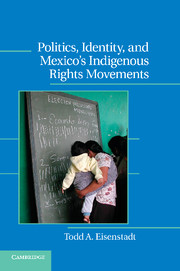Book contents
- Frontmatter
- Contents
- List of Tables and Figures
- Preface and Acknowledgments
- 1 SURVEYING THE SILENCE
- 2 A TALE OF TWO MOVEMENTS
- 3 INDIVIDUAL AND COMMUNITARIAN IDENTITIES IN INDIGENOUS SOUTHERN MEXICO
- 4 AGRARIAN CONFLICT, ARMED REBELLION, AND THE STRUGGLE FOR RIGHTS IN CHIAPAS' LACANDON JUNGLE
- 5 CUSTOMARY PRACTICES, WOMEN'S RIGHTS, AND MULTICULTURAL ELECTIONS IN OAXACA
- 6 FROM BALACLAVAS TO BASEBALL CAPS
- 7 RECONCILING INDIVIDUAL RIGHTS, COMMUNAL RIGHTS, AND AUTONOMY INSTITUTIONS
- Bibliography
- Index
- Titles in the series
5 - CUSTOMARY PRACTICES, WOMEN'S RIGHTS, AND MULTICULTURAL ELECTIONS IN OAXACA
Published online by Cambridge University Press: 04 April 2011
- Frontmatter
- Contents
- List of Tables and Figures
- Preface and Acknowledgments
- 1 SURVEYING THE SILENCE
- 2 A TALE OF TWO MOVEMENTS
- 3 INDIVIDUAL AND COMMUNITARIAN IDENTITIES IN INDIGENOUS SOUTHERN MEXICO
- 4 AGRARIAN CONFLICT, ARMED REBELLION, AND THE STRUGGLE FOR RIGHTS IN CHIAPAS' LACANDON JUNGLE
- 5 CUSTOMARY PRACTICES, WOMEN'S RIGHTS, AND MULTICULTURAL ELECTIONS IN OAXACA
- 6 FROM BALACLAVAS TO BASEBALL CAPS
- 7 RECONCILING INDIVIDUAL RIGHTS, COMMUNAL RIGHTS, AND AUTONOMY INSTITUTIONS
- Bibliography
- Index
- Titles in the series
Summary
Indigenous rights movements in Bolivia, Ecuador, and Mexico have drawn a huge amount of attention over the last decade. They have led to the ousting of presidents in both Andean nations, and Mexico's EZLN has won land concessions and forced indigenous rights issues prominently onto Mexico's public policy agenda. The movements have precipitated more drastic change in Bolivia and Ecuador than in Mexico, where only discrete legal changes have been made to recognize indigenous customary laws. This chapter evaluates new evidence on the scope limitations of usos y costumbres recognition (the selection of local leaders via traditional election practices rather than through parties and ballots) in Mexico's Oaxaca state, and puts these practices into the context of the broader normative debate over multiculturalism and pluralism. Usos y costumbres is practiced in a number of places in Mexico, as well as in other Latin American nations with strong indigenous rights movements. But Oaxaca may be alone in that usos y costumbres has been widespread and consistently practiced over a considerable time period in hundreds of municipalities.
The central objective of this chapter is to demonstrate that, as in Chiapas, Oaxaca's indigenous communities have been united as much by their socio-economic and land tenure status as by their ethnic identity. Building on the statistical models presented earlier, this chapter provides a narrative study of customary law practices in Oaxaca.
- Type
- Chapter
- Information
- Politics, Identity, and Mexico’s Indigenous Rights Movements , pp. 104 - 128Publisher: Cambridge University PressPrint publication year: 2011



